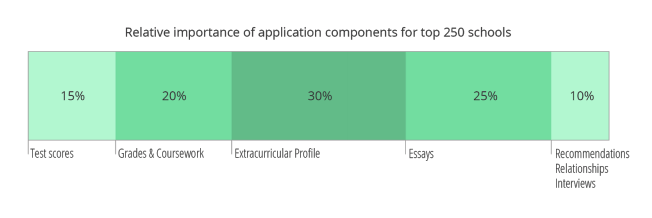10 Tips for Getting into College With a Low GPA
What’s Covered:
- How Important is GPA in College Admissions?
- Can You Get Into College With a Low GPA?
- How to Get into College with a Low GPA
- What Are Your Chances of Acceptance?
You know your GPA is an important factor in college admissions, but what if your grades aren’t as high as you—or your prospective colleges—might like?
Luckily, it’s still possible to get into college with a low GPA, and here’s how to do it.
How Important is GPA in College Admissions?
As the infographic below illustrates, grades and coursework typically account for about 20% of your entire application. This is a fairly large chunk, but keep in mind that this figure accounts for the rigor of your curriculum, not just grades. You should also note that your extracurricular profile and essays each outweigh the grades and coursework component.

That being said, many top-tier colleges use the Academic Index (AI) to streamline the admissions process. AI is a calculation that combines your entire academic performance into a single numerical score, representing your standardized test scores and transcript.
Academic Index is generally used to help admissions officers determine whether you meet the minimum academic qualifications for admission consideration. If your Academic Index is too low, you risk your application not even being reviewed. While your GPA might not be the most important component of your application in terms of overall evaluation, it’s vital to getting your application read in the first place.
Can You Get Into College With a Low GPA?
It’s possible to get into college with a low GPA, but it’s more difficult to gain admission because your application may not even be considered if you don’t meet minimum Academic Index thresholds. There are some strategies you can use to boost your chances, though, and there are some situations where colleges are generally more understanding of low GPAs.
If your GPA is lower due to exceptional circumstances, such as illness, tragedy, or family responsibilities/issues, colleges will take that into account. You’ll just want to make sure to explain these circumstances in the Additional Information section of the Common App (or other application).
If you’re an underrepresented minority, legacy student, or recruited athlete, you may still be admitted to colleges on your list even with a GPA below their average.
Not sure of your GPA? Use this calculator to help you figure it out—it could be higher than you think.
How to Get into College with a Low GPA
1. Improve your GPA if it’s not too late.
The best thing you can do to up your odds of admission is to improve your GPA—assuming, of course, it’s still possible. If you’re a freshman, sophomore, or even first-semester junior, this is doable, although it’s less achievable for older students.
Some strategies to improve your GPA include:
- Seeking support from a teacher, tutor, or peer
- Taking an easier course load (this will help your unweighted GPA, but you’ll receive more points for your weighted GPA if you have more AP or IB courses and do well in them)
- Increasing your course load, particularly with courses in your strongest subjects
2. Improve your test scores.
This is the easiest and fastest way of boosting your Academic Index. How can you improve your test scores? Try these strategies:
- Review your commonly-made mistakes to determine where you’re going wrong
- Set a target score based on the middle 50% range at your dream schools
- Join a study group or look for outside support
- Practice and practice some more—targeting the areas that need most improvement
Find more strategies for acing the SAT and ACT.
If you have a low GPA, having a good test score is even more important, as it can balance out any concerns colleges may have about your academic abilities. Even if your schools are test-optional, you should always try to take the SAT or ACT and perform well on it.
3. Trend upward.
A tough start to your high school career can submarine your overall GPA. A poor freshman or sophomore year may dig too big a ditch to climb out of. However, colleges look favorably on students who demonstrate steady improvement. For example, if you’re a C student in your freshman year who transforms yourself into an A or B student in your junior year, this shows promise and hints that you’re tapping into your full potential.
Your personal statement or the additional information field of the Common Application is a great place to explain your poor grades and what you did to turn them around.
4. Explain any external circumstances for a low GPA.
Use the additional information section to explain any external circumstances that have impacted your GPA. If you couldn’t put as much effort into your schoolwork because you were frequently babysitting younger siblings or went through a difficult time due to a parent’s illness, colleges will understand and not hold it against you.
You can also ask your guidance counselor to explain these situations in their recommendation, and you should also include them in the Additional Information section of the Common App.
5. Write stellar essays.
Your essays account for approximately 25% of your application—5% more than your grades and coursework. So, if you meet the overall academic thresholds (including test scores) or have extenuating circumstances, you can offset a weaker GPA with strong essays. Here, you can showcase your personality, as well as your writing prowess, to demonstrate that you’ll fit in with the student body at your college of choice.
Most colleges use the Common Application, and you can find advice for tackling each essay topic in our post How to Write the Common App Essays. Many colleges require supplemental essays, too, so be sure to check out our school-specific essay breakdowns as well.
6. Get strong recommendation letters.
Most schools ask for two to three teacher recommendations, and these, too, constitute an important part of your application. When asking your teachers for their help, consider not only which ones taught the classes in which you excelled but also which ones know you personally, as well as academically.
Someone with whom you engaged, who got to know you outside of class, too, is a good choice. Make sure to ask your teachers politely, give them ample time to write your recommendation, and thank them profusely. It’s a good idea to ask teachers who had you in class during your junior or senior year as a general rule of thumb.
7. Highlight non-academic strengths.
Extracurricular activities are the largest single factor in college admissions. If your academic performance isn’t up to a college’s standard, extracurricular activities can show that you have the characteristics to excel in a collegiate setting. Emphasize any leadership roles, how you’ve grown, and what you’ve learned outside the classroom.
Not all extracurricular activities are equivalent; after all, starting a non-profit to reduce food insecurity in your community isn’t the same as volunteering once a month at the local food pantry. The Four Tiers of Extracurricular Activities are an excellent resource for understanding how colleges view the commitments you pursue beyond academics.
8. Apply later with stronger grades and test scores.
Applying Early Action or Early Decision can offer an admissions advantage if you have a strong profile, but if your GPA is low, you’ll likely benefit by applying for Regular Decision. This gives you more time to bring up your grades, earn a standout test score, dazzle outside of the classroom, and ultimately show that you can succeed in college.
9. Apply to colleges that accept low GPAs.
Although a less-than-stellar GPA may prevent you from the most prestigious colleges, there are a number of schools that accept students with low GPAs. For example, many state university branch campuses typically have lower academic requirements than flagship or main campuses.
10. Consider applying to a community college.
If your GPA is holding you back from getting into your dream school, consider applying to a community college. Community colleges are also a great place to start your college career if you’re not academically ready for a four-year university. Then, after two years of excelling in one of these settings, you can apply to transfer to the main campus or a four-year school, if that’s still what you’re hoping to do.
What Are Your Chances of Acceptance?
Having a low GPA may limit your college choices, but there are probably plenty of schools that accept students with your GPA. Our free chancing engine will estimate your chances of acceptance at thousands of schools, based on your GPA, test scores, extracurriculars, and more.
With the chancing engine, you’ll be able to find schools where you have a good chance of acceptance. The chancing engine will also let you know how your profile stacks up against that of accepted students give you tips on improving your chances.



